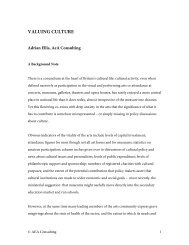Cultural diplomacy - Demos
Cultural diplomacy - Demos
Cultural diplomacy - Demos
Create successful ePaper yourself
Turn your PDF publications into a flip-book with our unique Google optimized e-Paper software.
<strong>Cultural</strong> Diplomacy<br />
one reason why touring tends to be to the US which is relatively poor<br />
in collections terms, but cash-rich. At a time when the UK has<br />
prioritised engagement with the new emerging powers, such as China<br />
and India, and has dramatically stepped up funding for science in<br />
these countries, there has been no significant shift in funding or other<br />
support for institutions that want to expand their work in these<br />
countries. Major performing companies, like the Royal Ballet and the<br />
Royal Opera, for example, require substantial financial and other<br />
kinds of support to be able to tour and if the barriers to entry are too<br />
high they will not be able to work there.<br />
We suggest that this kind of work be incentivised through three<br />
new activities. First, the government should create a one-stop-shop<br />
assistance unit for British cultural institutions wishing to work<br />
outside the UK. This would provide information about issues such as<br />
travel, visas and health; it could help to link British institutions with<br />
local partners in their destination countries; and it could provide<br />
information about potential funding sources. Second, a modest fund<br />
should be created to support first-time collaboration by UK<br />
cultural institutions in priority countries. This fund would help to<br />
build knowledge and capacity within the cultural sector about<br />
working in harder-to-reach countries. Often cultural institutions are<br />
not permitted to fund other institutions. The British Library recently<br />
provided a very large number of microfilms of Iraqi material for the<br />
Iraq National Library and Archive. This important diplomatic gesture<br />
would have been impossible without the modest £4500 provided by<br />
the FCO. There should be a mechanism through the one-stop-shop<br />
unit to share the growing body of information and best practice. And<br />
third, the British Council should be supported to further promote<br />
collaboration between UK cultural institutions in priority<br />
countries. We came across stories of British orchestras and other<br />
cultural professionals meeting by chance on the streets of cities like<br />
Beijing or Delhi, when they could have been collaborating to increase<br />
the overall impact and reach of their work.<br />
For their part, those cultural institutions that have not already<br />
done so should create international strategies, whose partial<br />
48 <strong>Demos</strong>






